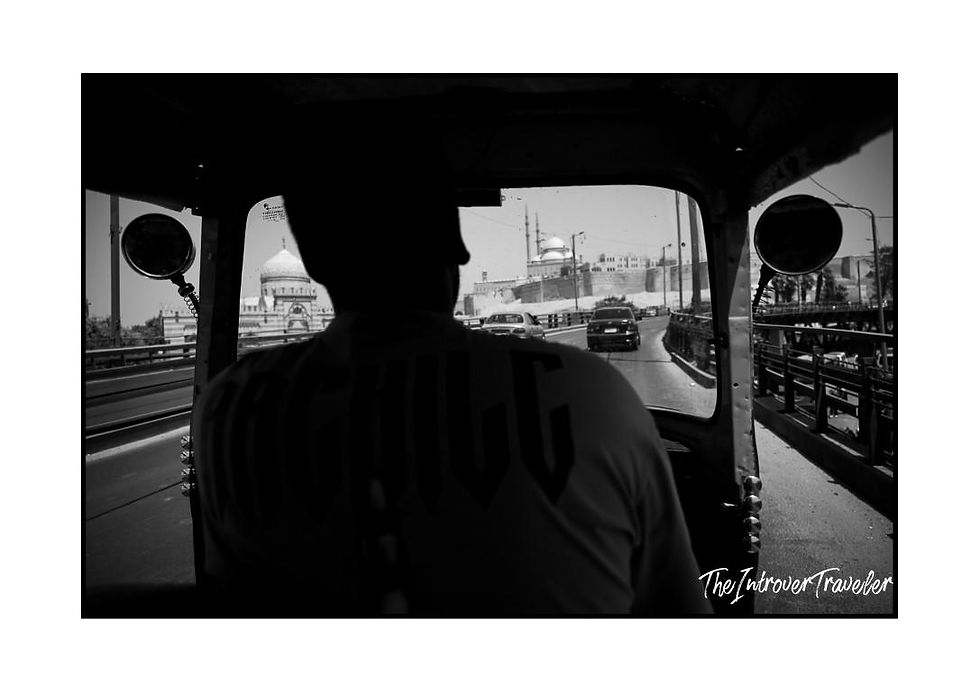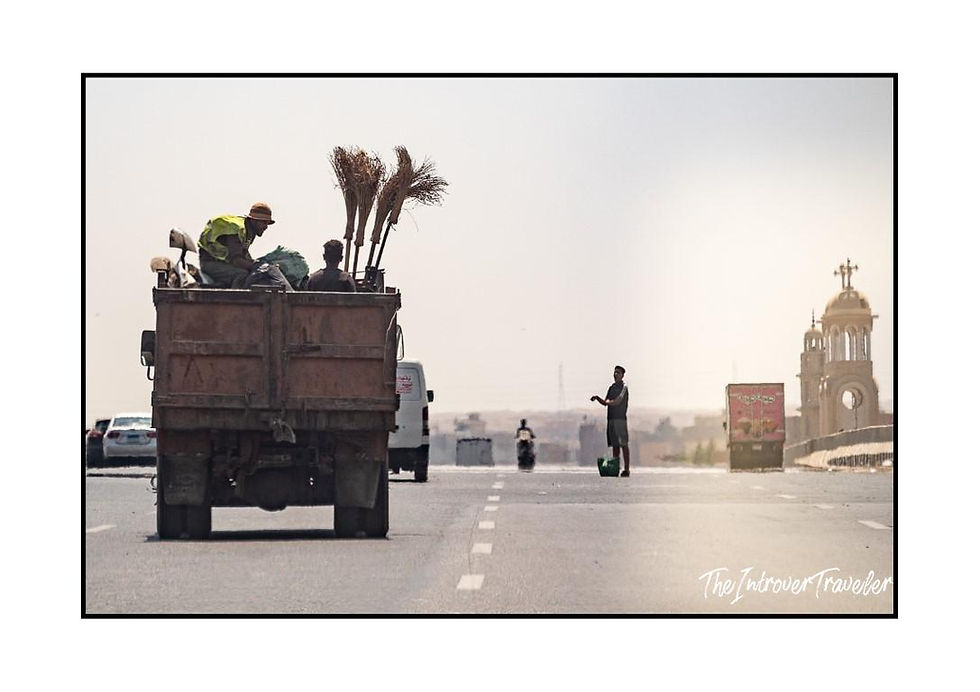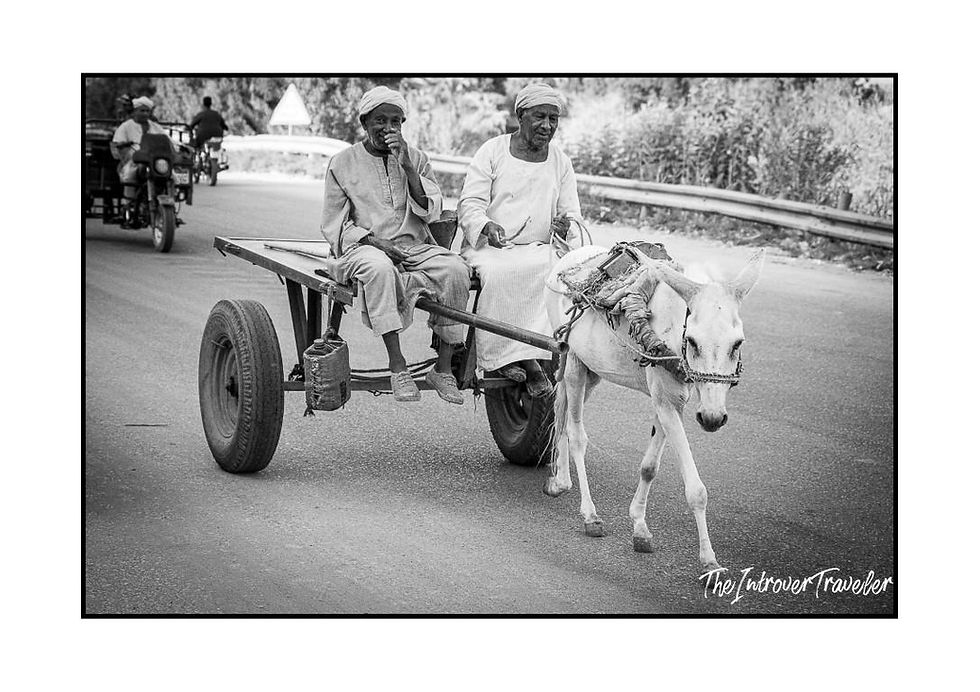Ahmed and the Cairene Bebop. A Tribute to Stefano Benni.
- The Introvert Traveler
- Sep 21, 2025
- 5 min read

A few days after I returned from Cairo, Stefano Benni passed away—a curious coincidence, because as I was venturing through the Cairene traffic in a taxi I was thinking of him: in La Compagnia dei Celestini he likened his bunkmates’ nocturnal farts to long oboe notes, while I was mentally likening the taxi drivers’ horn improvisations to a bebop concert. So here is my homage to Cairo’s traffic and its taxi drivers in the style of Stefano Benni—may the Luisona rest lightly upon him.
I discovered Cairo’s traffic the way you discover an upside-down pyramid: starting from the tip—namely the horn—and climbing back up through layers to the base, which is eternity. They say the Pyramids have lasted millennia, but here the Monumental Work is the Traffic Jam, built in superimposed eras: the tin tiles are the blocks, the traffic lights are burial chambers with flickering lamps, and the scooters are sacred scarabs guarding the secret passage from red to green (which, surprisingly, coincides with yellow—the miracle zone).
My taxi driver’s name was Ahmed. He wore the mustache of an orchestra conductor and a sand-colored shirt, as if he wanted to blend into the desert to avoid fines. “Welcome to the Symphony,” he said, starting the engine with the flourish of a magician who pulls a rabbit from a hat and a microbus from a top hat. “Here the horns talk.” He went “beep-beep” like a hummingbird with heart palpitations, then “BAAAP” like a baritone hippopotamus. “See? We converse here.” I looked outside: no one seemed to be listening to anyone. It was a convention of happy deaf people. “Exactly,” he smiled, “the best kind of conversation.”
We proceeded through the centuries. Yes, because every hundred meters the dynasty changed. Ahmed pointed them out with the baton of the windshield wiper, like a guide in a museum of sand:— “This is the Dynasty of Unified Bumpers, the Ancient Jam: it ruled for seven seasons of horn-rain.”— “Here we enter the Middle Traffic, the Age of Roundabouts: great circular sovereigns, very jealous of their radii.”— “Down there, see that long line? New Kingdom of Imaginary Lanes. Maps unavailable, but everyone knows where not to go.”— “Finally, the Ptolemaic era of the Double-Parked Car: hybrid culture, parking everywhere, stoic philosophy.”

Maestro Ahmed, like all Cairene taxi drivers, practiced non-Euclidean geometry. Where I saw a wall of sheet metal, he saw a quantum corridor as wide as a sigh. “Spaces aren’t empty,” he explained, “they’re just shy.” He threaded the taxi between a truck of dates and a cart of eggplants like a tailor passing a thread through the eye of a needle at full speed. I thought about my will; he thought about the drum kit: “ta-ta—ta-taa—beep.” The car ahead answered with a counterpoint: “beep-beep—baap.” It was bebop, without smoke or double bass, a Charlie Parker of tin and unleaded. Daring phrases, syncopations on the bumper, strategic pauses on the center line. The air vibrated like the skin of a djembe in the Khan el-Khalili market.
“There’s a lexicon,” said the Maestro. “One short tap: ‘I’m here.’ Two taps: ‘I saw you, but I’m pretending otherwise.’ One long: ‘Move, I’m thinking fondly of you.’ Two long: ‘I’m making the wrong choice but with style.’ A rising scale of three honks: ‘I’m about to invent a lane.’ A descending scale: ‘The lane invented me and now I don’t know how to get out of it.’” I looked at our neighbors. No one reacted. “It isn’t denotative language,” he added, “it’s jazz: if you understand it, fine. If you don’t, it still takes you somewhere.”
The Maestro corrected our course with micro-taps of the horn, like a surgeon of sheet metal. “Patience,” he said, “isn’t waiting. It’s choosing which mistake to ride.”
Under the overpasses we discovered the catacombs of Predynastic Traffic: sleeping cars, buses in meditation, a taxi in mystical crisis repeating “Yalla, yalla” like a mantra. “Here lie the founding jams,” the Maestro explained. “There’s the one from ’97, when a muezzin lost his pitch and all the cars changed lanes to look for it. There’s the jam of ’03, born when a tourist tried to understand the meaning of red. And there’s the great Unmotivated Stalemate of ’19: an absolute masterpiece—lasted three hours and no one ever knew why.”

At a certain point the sky turned to copper, the city took on the color of toasted semolina. We moved forward like a stubborn thought. The Maestro’s horn had become a trumpet on wheels: “be-bap-biiip—bap!” I, who understood nothing, began to nod the way you nod to a Parker solo: yes, of course, that augmented fifth on the hood, that altered chord with the microcar, that turnaround between two microbuses and a palm grove. “See?” he said. “The city is speaking to you.” “What is it saying?” “That we’ll get through.” “When?” “This isn’t semantics; it’s faith.”
Cairo’s traffic shifts time as well. Hours grow pleats, like a neatly ironed jalabiya that suddenly sits down. The meter didn’t mark numbers; it wrote verses—brief receipt-poems about imaginary kilometers and fatal detours. Now and then it tossed out a rhyme: “Sterzo/Verso,” “Corsia/Poesia,” “Clacson/Sassofon.” The Maestro nodded: “The lyric of going a little.”
There was a moment when everything stopped. A silence that felt like an act of universal courtesy. The city held its breath; the Nile changed sides of the bed so as not to disturb; the cat got up and pretended to have an appointment. Then, with the grace of an invisible conductor, everything started again: first the buses, then the taxis, then the thoughts. The Maestro, with a measured gesture, slipped along a metaphysical diagonal between a construction site and a flying baker. “Here we are in the Fifth Lane,” he said. “It doesn’t exist,” I objected. “Exactly.”
We arrived. The building of my tourist destinies looked at us with the air of one who has seen many things and is no longer offended by anything. I paid, but the Maestro refused three coins: “Keep them—they’re for the Dynasty to come.” I asked whether the horn, in the end, was any use for understanding one another. “No,” he said, “it’s for pretending to understand. And for playing. Every city has its instrument: Paris the flute, Berlin percussion, Naples the mandolin. Cairo? Bebop on four wheels. It’s played badly, often, but when it works… it takes you from A to B by way of Z, which is the most interesting letter.”
He got out, curled the car up the way a dog curls to sleep, and let the traffic jam grow around him like affectionate ivy. I looked back one last time: the Maestro had already dissolved into the score, a tiny point of brass in an endless stave. The traffic resumed its improvisation, and I understood that, in the end, no one travels here: everyone improvises. And they arrive all the same.





Comments